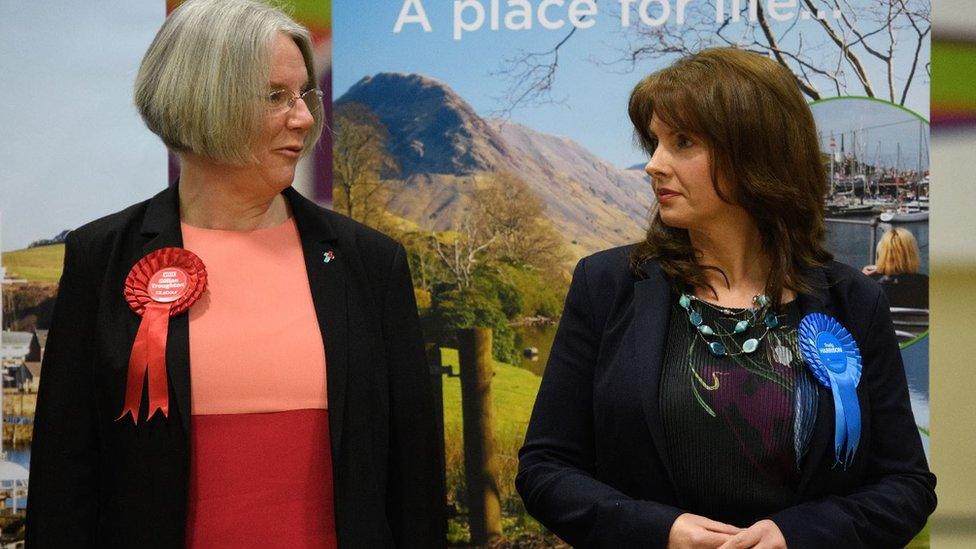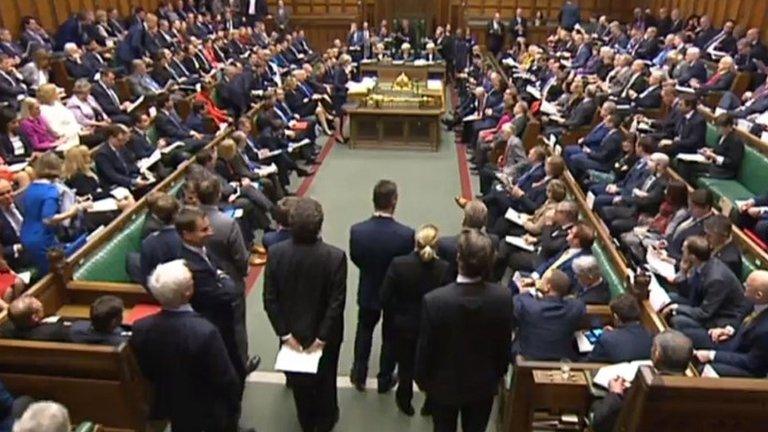General election 2017: Labour selects most female candidates
- Published

Trudy Harrison (right) was the 456th woman elected as an MP in the last 100 years, defeating Labour's Gillian Troughton in the Copeland by-election
Labour is fielding the largest proportion of female election candidates of the biggest parties - at 41%, BBC analysis shows.
This is lower than the 44% of women MPs Labour had in the last Parliament.
Women are standing for the Conservatives in 186 out of the 638 seats they are contesting - or 29%.
The SNP have women in 33% of seats they are contesting - 20 out of 59 seats. The Lib Dems have 191 female candidates out of 630 - 30%.
Labour is fielding 256 women out of 631 candidates.
A record 191 women were elected altogether in 2015 - around 30% of MPs.
Earlier this year, the election of Tory Trudy Harrison in Copeland took the number of women elected altogether in the past 100 years to 456 - roughly the same as the total number of male MPs in the 2015-2017 Parliament.
General election: What you need to know
Labour's draft election manifesto leaked
MPs recommended in January that political parties should be fined if they failed to ensure at least 45% of their general election candidates were female.
The Women and Equalities Committee said the fact that only 30% of current MPs were women represented a "serious democratic deficit" for "no good reason", and called for a change in the law after the next general election if that figure did not increase "significantly".
Both the Conservatives and Lib Dems are fielding a higher proportion of female candidates in the 2017 general election than they had as MPs in the last parliament.
Surprise election
Just over 21% of the Conservative MPs elected in 2015-17 were women.
Conservative peer Baroness Jenkin, co-founded the party's Women 2 Win - aimed at getting more Conservative women into Parliament - with Theresa May in 2005.
She told the BBC that, at the time, there were only 17 women Tory MPs - 9% of the parliamentary party.
While there was "a huge amount more to be done" she said they had succeeded in boosting numbers, incrementally, without using all-women shortlists.
"No party has done more in improving the numbers so significantly over the past 10 years."
The SNP is fielding 20 women out of 59 SNP candidates in Scottish seats, or 33.4%. In 2015, the SNP had 36 male MPs and 20 women (35.7%).
The SNP's Kirsty Blackman told the BBC that the surprise timing of the election had meant "less time to reach out to candidates from non-traditional backgrounds".
The Lib Dems lost all their female MPs in their near-wipeout in the 2015 election.
The party was reduced to eight male MPs, though Sarah Olney's victory in last year's by-election in Richmond Park later gave them back one female MP.
- Published10 January 2017
